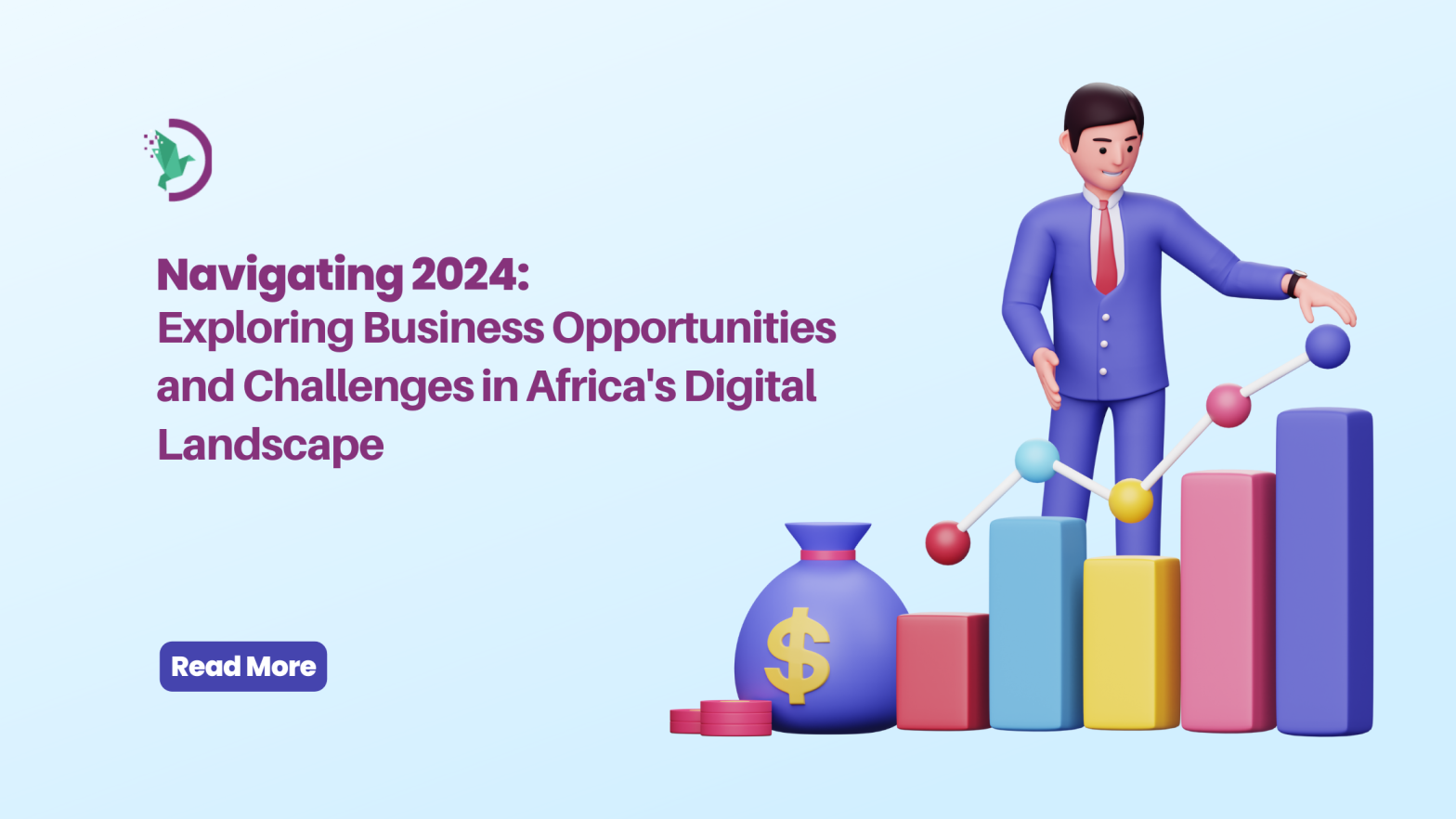Have you noticed the revolution in Africa’s digital landscape?
The growth of ecommerce, social media management and marketing, and content creators in Africa’s digital landscape has shown that there has been a rapid and transformative evolution. This growth can be attributed to the increase in internet penetration, smartphone adoption, and a burgeoning young population eager to embrace technological advancements.
Do you agree with this, If yes Kindly let’s roll. As we approach 2024, businesses across industries are poised to capitalize on this dynamic landscape, while also navigating the challenges that come with it.
Overview of Africa’s evolving digital landscape
Africa’s digital transformation is driven by several key factors:
-
Increasing internet penetration: The continent’s internet penetration rate has increased significantly in recent years, reaching 46% in 2022.
-
Smartphone adoption: Smartphone adoption is soaring, with over 600 million mobile subscribers in Africa.
-
Young and tech-savvy population: Africa has the youngest population globally, with over 60% under the age of 25, and many are tech-savvy and eager to adopt new technologies.
Significance for businesses in 2024
The evolving digital landscape presents both opportunities and challenges for businesses operating in Africa.
Opportunities:
-
Access to a vast and growing market: Africa’s digital market is expected to reach $711 billion by 2025, offering businesses a vast and untapped market.
-
New avenues for customer engagement: Digital platforms provide businesses with new and direct channels which have been effective and efficient for customer engagement, generating quality leads, nurturing relationships, and driving sales.
-
Cost-effective operations: Digital technologies have proved to be of optimum importance to businesses in streamlining operations, reducing costs, and improving the efficiency of employees
Challenges:
-
Infrastructure limitations: Internet connectivity and infrastructure remain a challenge in many parts of Africa, particularly in rural areas.
-
Data security and privacy concerns: Data security and privacy concerns need to be addressed to gain consumer trust in digital transactions.
-
Digital skills gap: There is a shortage of skilled digital professionals in Africa, which can hinder businesses’ digital transformation efforts.
Areas of Opportunity & Challenge to Explore in the African Digital Sphere
We will explore the following specific areas of opportunity and challenge in Africa’s digital sphere:
-
The growth of e-commerce
-
Digital payment systems
-
Connectivity and infrastructure
-
Data privacy and security
-
Talent and skill development
The Growth of E-commerce
Ecommerce can be perceived to be yet at its peak globally, Africa is not lagging. It however has birthed various online marketplaces like Jumia, Kilimall, and Konga providing consumers with a convenient and diverse range of products and services.
When considered properly, ecommerce is often regarded as the buying and selling of goods/products and services via the Internet. Thus with the amazing mineral resources and long list of cultural and agricultural produce, it can be sold easily and conveniently from the comfort of your home (at the fingertips)
Ecommerce presents an amazing opportunity for entrepreneurs in Africa to dive into the global market without walls or flight fees. Here are the top 3 platforms in Africa
-
Jumia: The largest e-commerce platform in Africa, operating in over 15 countries.
-
Kilimall: A leading e-commerce platform in East Africa, particularly in Kenya and Uganda.
-
Konga: A prominent e-commerce platform in Nigeria, offering a wide range of products.
Aside potential of ecommerce in Africa, the experience customers get while shopping Online is increasingly popular among African consumers, driven by factors such as convenience, affordability, and wider product selection as in the case of Mobile commerce
Mobile commerce (m-commerce) is particularly significant in Africa, where smartphone penetration is high and internet access through computers is limited. With over 600 million mobile subscribers in Africa, m-commerce has become a primary channel for online shopping and transactions.
The strategy for highly successful mobile commerce is that businesses need to ensure their websites and platforms are mobile-optimized to provide a seamless user experience for e-commerce customers.
Digital Payment Systems
Traditional cash payments remain prevalent in Africa, but digital payment systems are gaining traction, such as mobile money platforms, fintech businesses like Kuda bank, Opay etc
Mobile money platforms like M-Pesa and MTN MobileMoney have revolutionized financial inclusion in Africa, allowing for cashless transactions and financial services.
African fintech startups are developing innovative solutions to address financial challenges, such as digital lending, micro-insurance, and mobile banking.
There are Challenges in digital transactions
Despite the advantages of digital transactions, there are security concerns and regulatory hurdles which pose challenges to the wider adoption of digital payment systems.
Data security and fraud prevention are critical concerns for both consumers and businesses engaging in digital transactions.
Varying regulations across African countries can hinder the seamless implementation and adoption of digital payment solutions.
Connectivity and Infrastructure
Internet accessibility in Africa varies significantly, with urban areas generally having better connectivity than rural regions. Internet penetration in urban areas is higher, with 75% of city dwellers having access to the internet compared to 37% of rural residents.
Numerous initiatives are underway to expand internet connectivity to rural areas, including fibre optic cable deployments and satellite internet solutions.
Advancements in 5G technology have the potential to revolutionize connectivity in Africa. 5G networks are being rolled out in several African countries, offering faster speeds, lower latency, and increased capacity.
Potential implications for businesses: 5G can enable businesses to leverage new technologies like the Internet of Things (IoT) and artificial intelligence (AI) for enhanced operations and customer experiences.
Data Privacy and Security
Africa is gradually adopting data protection regulations, with GDPR-inspired frameworks being implemented in some countries such as
a. The General Data Protection Regulation GDPR-inspired regulations have influenced data protection laws in Africa, emphasizing consumer data rights and protection.
b. Businesses need to comply with these regulations to ensure data security and gain consumer trust.
c. Cybersecurity is a growing concern in Africa, with businesses needing to mitigate risks from cyber attacks.
Common risks include Phishing, malware, ransomware, and data breaches are among the common cybersecurity threats faced by businesses in Africa.
Implementing robust cybersecurity measures, educating employees about cybersecurity best practices, and conducting regular security audits are essential.
Talent and Skill Development
A shortage of skilled digital professionals in Africa poses a challenge for businesses seeking to implement digital transformation initiatives. It is therefore important that tech and digital education initiatives bridge the digital skills gap, such as tech education programs and partnerships between universities and tech companies.
The rise of remote work has created new opportunities for skilled digital professionals to work for African businesses from anywhere in the world. Businesses can contribute to bridging the digital skills gap through:
Corporate Responsibility: Initiatives like employee training programs, mentorship programs, and partnerships with tech education institutions can enhance employee digital skills.
Collaborative initiatives for skill development: Collaborations between businesses, governments, and educational institutions can scale up and diversify digital skills training programs.
Africa’s digital landscape offers a wealth of opportunities for businesses to tap into a vast and growing market, engage with customers in new ways, and streamline operations.
However, businesses must navigate challenges such as infrastructure limitations, data security concerns, and the digital skills gap to fully capitalize on this dynamic digital era.
By investing in connectivity infrastructure, prioritizing data security, and fostering a culture of digital literacy and skill development, businesses can thrive in Africa’s ever-evolving digital sphere.


